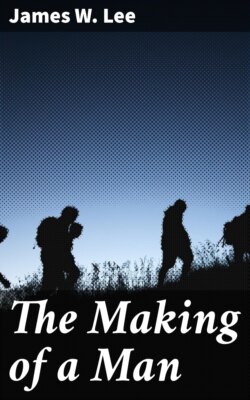Читать книгу The Making of a Man - James W. Lee - Страница 5
На сайте Литреса книга снята с продажи.
I.
ОглавлениеTable of Contents
Writers of a certain school have sought to minify man’s place in nature. They say, as Dr. Joseph Leconte well declares, that he is very closely connected with, and forms a most insignificant part of, nature—that he has no kingdom of his own, but belongs to the animal kingdom; that in the animal kingdom he has no department of his own, but belongs to the department of the vertebrates—along with birds, reptiles, and fishes; that in the department of the vertebrates he has no privileged class of his own, but belongs to the class of the mammals, along with four-footed beasts; that in the class of mammals he has no titled order of his own, but belongs to the order of primates, along with monkeys and baboons. His conscience is but the resultant of fear and instinct, slowly deposited through the years of his evolution. Its imperiousness is self-constituted. Its scepter it has usurped, and, from the exhalations of its own rising cowardice, it has woven the purple robes which constitute the badge of its authority. His morality consists of rules imposed by his own prudence, and which have no sanctions beyond the opinions of his class or tribe. His religion is determined by the physical conditions which surround his life—his geographical situation, the nature and configuration of his soil, his climate, and his food. Thus man is simply a natural product, while the civilization which he has produced is as much determined by the physical conditions surrounding his life, as the leaves and dates of the palm are determined by the physical conditions surrounding that tropical tree. The hopes and the trials, the courage and the sacrifice of the best men, as well as the ambitions and motives of the worst, are put on a level with the damps and winds. The one class is entitled to no more credit for what is noble and heroic, than is rain for nourishing the crops; while the other deserves no more rebuke for what is base and ignoble, than the lightning for striking the Church and killing the people. The love which expresses itself in monuments to commemorate the deeds of the good and the great, and the condemnation which lifts itself into jails to confine the criminal and the outlaw, have, in the last analysis, the same meaning. There is no sacred significance or obligations rooted in divine sanctions, in either the monuments or the jails. Both are but fickle phases of the passing spirit.
The convictions of Moses, reproducing themselves in the government, laws, literature, morality, and religion of a great people, conserving them through the ages as examples of order and health, have no more meaning than the sap which rises in some monarch of the forest, to express itself in leaves and fruit. The conceptions of duty, which nerved the heart and inspired the courage of the Apostle Paul, leading him to plant churches in Asia Minor, to become the seeds of modern civilization, were as completely natural as the rising of the waters of some mountain spring, to flow over silver sands to the sea. The music of Beethoven, the visions of Raphael, were but as the vapor in the light of the morning sun, beautiful, perhaps, as the rainbow, but going out with the setting day. Whatever of emotion or conscience they embodied, signified no more than the colors of the peach bloom, or the notes of the falling cascade. However esteemed the valor that risked life to break the reign of oppression and murder, it was but a varying form of the heartless ambition that sought in strength to make it prevail. The patriotism of Leonidas, giving up his life to save his country, and the insane act of Nero, swathing Christians in tar to light his feast, were forward and reverse movements of the same human spirit; both natural, and both as unmoral as the electricity that now strikes to destroy, and now burns the malaria to save. No difference is made between poison in the fangs of snakes, and mercy in the hearts of men.
Back of nature there is no purpose, and in its manifold combinations and adaptations there is no design. It is only a vast aggregate of unresting atoms, striking one upon another, and without intention and without purpose, forming pairs, clusters, and groups, and thus assuming the shapes we see. Why there happens to be order instead of chaos hangs on the uncertain turn of luck.
